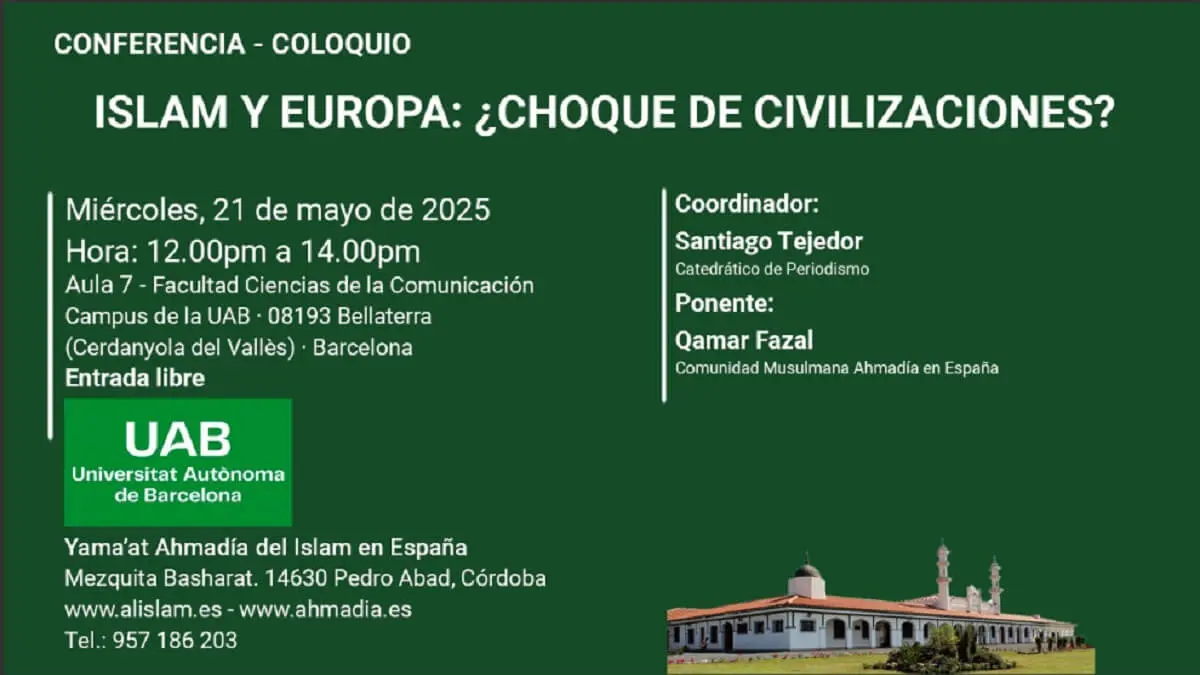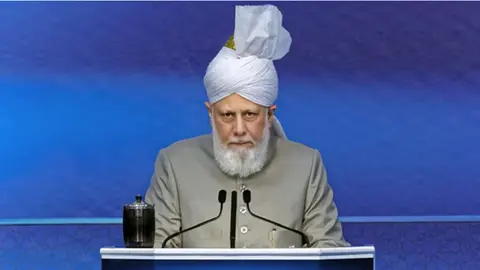Islam and Europe: clash of civilisations?

The Ahmadiyya Muslim Community in Spain is holding a conference-colloquium at the Faculty of Communication Sciences on the UAB Campus in Bellaterra, Cerdanyola del Vallès, Barcelona, on Wednesday 21 May 2025 from 12:00 to 14:00. Admission is free, and an Indian-Pakistani tasting will be served to attendees at the end.
The Ahmadiyya Community has provided an excerpt of the topics to be discussed at the conference:
Today, especially in Western and developed nations, there is a great deal of debate about immigration and its effect on societies. Much of the debate focuses on Muslims because a view has developed that there is an insurmountable divide between Muslims and other members of society. Certain governments and members of society fear a clash of civilisations; they believe that Muslims are a threat to their society and that they cannot integrate into the Western world.
Immigrants have come to Western countries from many countries, but it is the influx of Muslims that has caused the most concern and alarm. Many native inhabitants fear that mass immigration from Muslim countries threatens their civilisation, culture and values, which have endured for so many centuries.

In chapter 2, verse 257, the Holy Quran has categorically stated that ‘there shall be no compulsion in religion’. The hateful ideology of a small minority of so-called Muslims who have adopted extremism has no correlation with the teachings of the Holy Quran. As far as the Ahmadiyya Muslim Community is concerned, we believe that under no circumstances does Islam permit the use of force or any kind of coercion in spreading the faith.
Verse 37 of chapter 4 says:
‘And worship Allah and join not any partner with Him, and be kind to parents, and to relatives, and to orphans, and to the needy, and to the neighbour who is a friend and the neighbour who is an enemy, and to the companion on your journey, and to those whom your right hands possess […]’
How can this teaching, which requires Muslims to love and honour their parents, differ from that of any other religion or nation? How can this teaching undermine Western society?

When it comes to the needy, one of the essential ways to help them is through education. This will enable the youngest members of society, who come from broken homes or suffer from poverty, to free themselves from the shackles of destitution. New opportunities will open up for them and, free from frustration and resentment, these young people will grow up to become productive members of society, rather than being drawn into a life of crime or gang culture. Rich countries should help the world's weaker nations build their own solid foundations. If the poorest countries could develop their economies and infrastructure, their people would have opportunities at home and fewer reasons to emigrate abroad.
The Founder of Islam (peace and blessings of God be upon him) taught us that if a person is not grateful to his fellow human beings, he cannot be grateful to God. It is necessary that, along with worshipping God, a Muslim fulfils his obligations towards humanity. If Muslims come seeking to integrate, to fulfil their obligations, and to strive for peace and to improve society, then surely this is something to be praised, not condemned or punished.
Some people argue or believe that Muslims are instructed to carry out ‘jihad’ and therefore fear that they will come to the West and wage violent war to impose Islamic civilisation and culture. It is necessary to clarify that, during the early period of Islam, Muslims were forced to defend themselves after war was declared on them for practising their faith. Those defensive wars were fought to protect the institution of religion and defend the principle of freedom of belief. In chapter 22, verses 40-41, the Holy Quran states that if the aggressors are not stopped, all churches, synagogues, temples, mosques and other places of worship would be under serious threat, as the underlying intention of the disbelievers of Mecca was to destroy every trace of religion from the face of the earth. This proves that Islam protects all religions.
On one occasion, a companion of the Holy Prophet Muhammad (pbuh) asked to join the Muslim army so that he could participate in ‘Jihad.’ The Prophet of Islam (pbuh) rejected his request, saying that since his parents were weak, he should stay at home, take care of them, and consider that to be his ‘Jihad.’ If the objective of ‘Jihad’ were conquest, bloodshed, and war, the Prophet of Islam (pbuh) would certainly have accepted his offer and would have tried to strengthen the Muslim army.

Another very common accusation in the Western world is that Muslims do not respect women or their rights. It should be noted that Islam was the first religion to grant women the right to inherit, the right to divorce, and other rights. Furthermore, Islam emphasises the great importance of educating girls and giving them the opportunity for personal growth and development. In chapter 4, verse 20, the Holy Quran has stated that Muslim men must treat their wives with love and respect. In Western countries, not a day goes by without news of the police or courts being forced to intervene and deal with terrible cases of domestic violence. Various reports and studies show that such crimes are not linked to any religion. Therefore, it is completely unfair to label Islam as a misogynistic religion. Islam is a religion that bestows honour and dignity upon women; and any man who treats a woman with cruelty is guilty of seriously violating the teachings of Islam.

Islam also requires its followers to respect the religious feelings and beliefs of other people. The Pact of Medina was a true illustration of this teaching, where the Torah was recognised and respected as the law-bearing scripture of the Jews.
In chapter 24, verse 34, the Holy Quran states that if a ‘slave’ seeks freedom, he should be set free, and if certain monetary quotas have been imposed, they should be reasonable and payable in small instalments that are easy to pay, or they should not be imposed at all. In today's world, ‘physical slavery’ has been replaced by ‘economic slavery and servitude,’ whereby the relationship between the most powerful nations on earth and the weakest countries is similar to that of a ‘master and slave.’ For example, rich countries grant loans disguised as aid packages to weak nations that have no choice but to accept the conditions imposed on them. Invariably, the crippling interest rates imposed on them mean that short-term loans lead to long-term misery and debt.
In short, Islam is not a threat to Western civilisation or its culture. If there are Muslims who usurp the rights of non-Muslims, it is only because they reject the teachings of Islam, or ignore them completely. They dishonour Islam and only succeed in defaming its blameless name.
Instead of talking about a clash of civilisations, or unnecessarily increasing tensions between different communities, we must refrain from attacking the religious teachings of others. Instead of trying to impose restrictions on expressions of faith, we must recognise that we are all part of a human race that is more connected than ever before. We must embrace our diversity and focus on building unity so that long-term peace can take hold in the world. Today, however, we see the opposite: both Muslim and non-Muslim countries are putting their own interests above the interests of the world at large, and are crossing all boundaries of fairness and morality in order to achieve their own goals.

Reminiscent of the dark days of the past, opposing blocs and alliances have formed, and it seems that the world is bent on self-destruction. Many countries possess nuclear bombs and other destructive weapons that have the potential to destroy civilisation as we know it. Who can guarantee that these weapons will never be used, or that they will not end up in the wrong hands? All it takes is one miscalculation or one false step for hostilities to unleash the unthinkable. The consequences of such a war are unimaginable, but it is safe to say that the world will never be the same again.
Therefore, instead of fanning the flames of hatred, whether based on religious or ethnic differences or political objectives, we must recognise the warning signs and change our attitudes before it is too late.

Let us all unite, regardless of our differences, and work in a spirit of mutual respect, tolerance and affection for world peace and freedom of belief.









